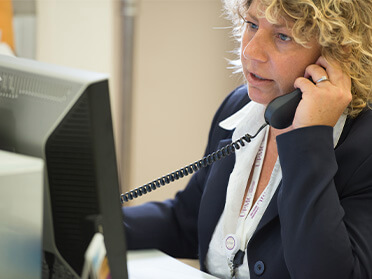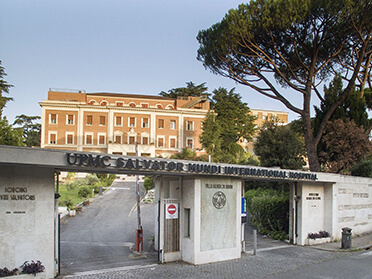Otolaryngology at UPMC Salvator Mundi International Hospital
The ENT service of UPMC Salvator Mundi International Hospital focuses on prevention, diagnosis, and treatment (also surgical) of ear, nose, and throat conditions, for both adult and pediatric patients.
Conditions We Treat
Our ENT specialists treat a wide range of conditions, including:
- Tinnitus.
- Adenoiditis, pharyngitis, and tonsillitis.
- Rhinitis and sinusitis.
- Snoring and sleep apnea.
- Nasal septal deviation.
- Epistaxis.
- Sinonasal polyposis.
- Sinonasal tumors.
- Inflammations and diseases of the outer and middle ear.
- Peripheral vertiginous syndromes.
- Transmissive and sensorineural deafness.
- Salivary gland diseases.
- Voice and swallowing disorders (phoniatry, vocal, clinical, and artistic rehabilitation).
- Cervical swelling and adenopathies.
- Inflammations and tumors of the oral cavity, pharynx, and larynx.
- Functional and organic dysphonias.
- Otolaryngological manifestations of inflammatory and infectious systemic diseases.
- Head and neck cancer.
ENT Services at UPMC Salvator Mundi International Hospital
Diagnostics and consults
We offer a comprehensive range of medical and diagnostic services to establish the treatment strategy best suited to the specific needs of each patient.
The following services are available at our facility:
- ENT assessment: for the diagnosis of ENT conditions.
- Audiological assessment: to assess the health of the ear.
- Nasal endoscopy: to diagnose sinusitis and other nose disorders.
- Laryngeal endoscopy: to assess the larynx, pharynx, and nasal pits.
- Otomicroscopy: to assess the ear canal and eardrum using an optical microscope.
- Rhinofibrolaryngoscopy (HD): for direct observation of the nasal cavities.
- Stroboscopy: to diagnose voice disorders.
- Pure-tone audiometry: in order to assess the hearing ability, the doctor exposes the patient to sounds of different intensity and tone using air and bone conduction.
- Acoustic immittance test: assessment of the elasticity of the eardrum and the bony ossicles connecting the outer ear to the inner ear
- Vestibular test: to assess the level of vertigo or the presence of labyrinthitis.
Surgical services
Our team of specialists is expert in many surgical procedures:
- Tympanoplasty and myringoplasty: surgery aiming at repairing and reconstructing the tympanic membrane.
- Otosclerosis surgery: replacement of the stapes bone with a prosthesis.
- Implantation of auditory prostheses: an alternative to external hearing aids.
- Inferior turbinate surgery: to decongest the mucosa of the inferior turbinates and correct their hypertrophy.
- Radiofrequency-assisted uvulopalatoplasty: to treat moderate-to-severe sleep apnea.
- Chronic snoring surgery: surgical treatment on the mucous membranes in the pharyngeal tract of the upper airways.
- Endoscopic sinonasal surgery: to correct trauma or malformations of the nose.
- CO2 laser microlaryngoscopy surgery: a non-invasive procedure indicated for the treatment of benign organic diseases and malignant tumors.
- Sinonasal tumor surgery: minimally-invasive techniques aimed at the treatment of benign tumors and malignant sinonasal tumors.
- Salivary gland surgery: for the treatment of various diseases, including benign or malignant tumors of the salivary glands.
- Surgery of cervical-facial tumors: for the treatment of tumors affecting various areas, including the oral cavity, pharynx, larynx and hypopharynx, as well as the salivary glands and thyroid.
- Phonosurgery: for the treatment of various organic diseases of the voice and vocal cords, including edema, cysts, dysplasia and pre-cancerous conditions, granulomas, hypertrophies, polyps, vocal tremors and spasmodic dysphonias.
If you suffer from an oncological disease, our specialists will offer you the most suitable treatment.
Surgically implantable hearing aids
Among the latest solutions to deafness, the latest generation of surgically implantable prostheses make it possible to correct disorders that are difficult to treat with traditional external prostheses. The new procedures can be passive, involving the use of micro prostheses, or active, electromagnetic, piezoelectric or cochlear. These include state-of-the-art solutions that can be interfaced to the smartphone via a small device equipped with a magnet that is implanted under the skin.
Surgically implantable prostheses are particularly effective in the following cases:
- Unilateral complete hearing loss.
- Mono- and bilateral conductive deafness.
- Bilateral hearing loss of some medium and severe types.
- Situations with narrow external auditory canals or subject to frequent inflammation.
- Intolerance of the patient to external prostheses.
Types of implantable hearing aids
- Bone-conduction prostheses.
- Prostheses with total implantation in the ear, without any visible external component.
- Inner ear prostheses, for severe or deep forms.
Our Doctors
- Dr. Gilberto Acquaviva
- Dr. Giorgio Balsamo
- Dr. Pio Bevilacqua
- Dr. Italo Cantore
- Dr. Valentina Casto
- Dr. Michele Catalano
- Dr. Marco Fantini
- Dr. Lanfranco Fiorini
- Dr. Andrea Marzetti
- Dr. Francesco Ronchetti
- Prof. Guido Coen Tirelli
Ear, Nose, and Throat (ENT) at UPMC
Ear, Nose, and Throat (ENT) at UPMC.

We offer medical services and services on a private basis or in agreement with the main insurance companies. Some of our services are also affiliated with the National Health System.
For more information on active agreements, visit:


